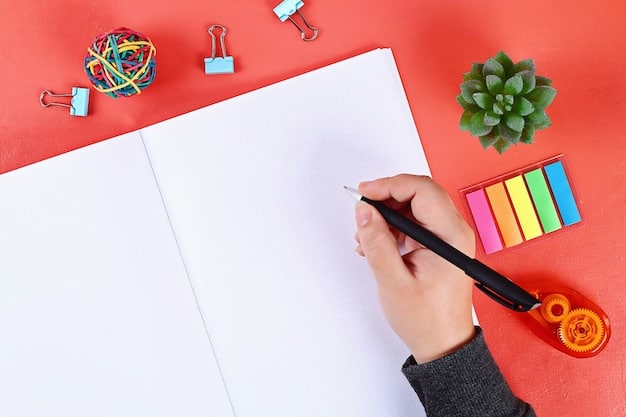Self-Care Sundays: Journaling for Self-Reflection & Growth

Advertisements
Self-Care Sundays provide an ideal opportunity to explore personal growth through journaling, a powerful tool for self-reflection, mindfulness, and emotional well-being, helping individuals to understand their thoughts, feelings, and experiences in a structured and meaningful way.
Elevate your self-care routine with the transformative power of journaling. Self-Care Sundays: Learn the Art of Journaling for Self-Reflection and Personal Growth and will help you discover how this simple practice can unlock profound insights and foster a deeper connection with yourself.
Advertisements
The Power of Journaling for Self-Care
Journaling is more than just writing down your thoughts; it’s a pathway to understanding yourself better. It allows you to process emotions, track personal growth, and gain clarity on your goals and aspirations.
Why Journaling is Essential for Self-Care
Incorporating journaling into your self-care routine provides a structured way to reflect on your experiences. It’s a tool for emotional processing that can lead to greater self-awareness and resilience.
Benefits of Regular Journaling
Consistency is key when it comes to journaling. The more you practice, the more benefits you’ll experience, from reduced stress to improved mental clarity.
- Improved emotional regulation.
- Increased self-awareness and understanding.
- Enhanced problem-solving skills.
- Reduced stress and anxiety.
By consistently putting pen to paper (or fingers to keyboard), you create a safe space to explore your inner world, free from judgment and external pressures. Over time, this practice can significantly improve your overall well-being, offering insights that you might otherwise miss.
Setting Up Your Journaling Practice
Starting a journaling practice doesn’t have to be complicated. With a few simple steps, you can create a routine that fits your lifestyle and supports your self-care goals.
Choosing the Right Journal
The type of journal you choose can influence your journaling experience. Consider factors such as size, binding, and paper quality to find one that resonates with you.
Finding Your Journaling Space
Designating a specific space for journaling can help you create a consistent and comfortable routine. Choose a location that is free from distractions and conducive to reflection.
- Select a quiet and comfortable environment.
- Ensure proper lighting and temperature.
- Minimize interruptions and distractions.
- Personalize the space to make it inviting.
Your journaling space should be a sanctuary where you feel safe, relaxed, and inspired to explore your thoughts and feelings. Whether it’s a cozy corner in your home or a peaceful spot in nature, the key is to create an environment that supports your journaling practice and enhances your self-reflection.

Journaling Techniques for Self-Reflection
There are various techniques you can use to enhance your self-reflection through journaling. Experiment with different approaches to find what works best for you.
Free Writing
Free writing involves writing continuously for a set period without worrying about grammar or structure. This technique allows you to explore your thoughts without censorship.
Prompt-Based Journaling
Using journaling prompts can provide structure and direction to your reflections. Prompts can range from simple questions to more complex scenarios.
- What are you grateful for today?
- What challenges are you currently facing?
- What are your goals for the next week?
- What are your greatest strengths?
By using these prompts, you can dive deeper into specific areas of your life, uncovering insights and developing a clearer understanding of your thoughts, feelings, and aspirations. It’s a way to gently guide your self-reflection and make the most of your journaling practice.
Overcoming Journaling Challenges
It’s common to encounter challenges when starting or maintaining a journaling practice. Recognizing these obstacles and developing strategies to overcome them can help you stay consistent.
Dealing with Writer’s Block
Writer’s block can be frustrating, but there are several strategies you can use to overcome it. Try changing your journaling environment or using different prompts.
Making Time for Journaling
In today’s fast-paced world, finding time for self-care can be difficult. Prioritize journaling by scheduling it into your daily or weekly routine.
- Set aside a specific time each day or week.
- Treat journaling as a non-negotiable appointment.
- Combine journaling with other self-care activities.
- Be flexible and adjust your schedule as needed.
By treating journaling as an essential part of your self-care routine, you’re more likely to stick with it and reap the many rewards it offers. Remember, even a few minutes of journaling can make a significant difference in your overall well-being.

The Connection Between Journaling and Mindfulness
Journaling and mindfulness go hand in hand, enhancing each other to promote greater self-awareness and emotional well-being. By integrating these practices, you can cultivate a deeper understanding of your thoughts, feelings, and experiences.
Practicing Mindfulness Through Journaling
Journaling can be a form of mindfulness practice, allowing you to focus on the present moment and observe your thoughts without judgment. This can lead to greater emotional clarity and self-acceptance.
Using Journaling to Enhance Mindfulness
Conversely, mindfulness can enhance your journaling practice by helping you approach your reflections with greater awareness and compassion. This can lead to deeper insights and more meaningful self-discovery.
- Pay attention to your breath as you write.
- Notice any physical sensations in your body.
- Observe your thoughts and feelings without judgment.
- Be present in the moment and fully engage in the process.
When you combine the power of journaling with the practice of mindfulness, you create a powerful tool for self-reflection and personal growth. It’s a way to tune into your inner world, gain valuable insights, and cultivate a greater sense of peace and well-being.
Integrating Journaling into Your Self-Care Sundays
Making journaling a regular part of your Self-Care Sundays can transform your weekends into opportunities for deep self-reflection and personal growth. By dedicating time to this practice, you’re investing in your overall well-being and creating a more balanced and fulfilling life.
Creating a Self-Care Sunday Journaling Routine
Start by setting aside a consistent time each Sunday for journaling. Experiment with different techniques and prompts to find what resonates with you. Consider incorporating other self-care activities to enhance the experience.
Tracking Your Progress and Growth
Over time, review your journal entries to track your progress and identify patterns in your thoughts and feelings. This can provide valuable insights into your personal growth and areas where you may want to focus your attention.
- Set clear intentions for your Self-Care Sundays.
- Create a relaxing and inviting journaling environment.
- Use journaling prompts to guide your reflections.
- Incorporate other self-care activities, such as meditation or yoga.
By integrating journaling into your Self-Care Sundays, you’re creating a powerful ritual that supports your emotional well-being and personal growth. It’s a way to prioritize self-reflection, gain valuable insights, and cultivate a deeper connection with yourself.
| Key Point | Brief Description |
|---|---|
| ✍️ Journaling Benefits | Improves emotional regulation and self-awareness. |
| 🧘 Mindfulness Integration | Combines journaling with mindfulness for deeper insights. |
| 📅 Sunday Routine | Establishes a consistent journaling practice on Sundays. |
| 🧭 Technique Variety | Experiment with free writing and prompt-based methods. |
Frequently Asked Questions
▼
The best time to journal is whenever you can consistently dedicate a few minutes. Many find mornings or evenings to be ideal, but it ultimately depends on your personal schedule and preferences.
▼
If you’re unsure what to write, try using journaling prompts, such as “What are you grateful for?” or “What challenges are you facing?” You can also simply start by describing your day.
▼
There’s no set time limit for journaling. Even 5-10 minutes can be beneficial. Focus on making it a consistent practice rather than worrying about the duration of each session.
▼
Yes, journaling can be a powerful tool for managing anxiety and stress. It allows you to process your emotions, gain perspective, and identify triggers, all of which can help reduce feelings of overwhelm.
▼
Besides traditional writing, you can try bullet journaling, art journaling, or gratitude journaling. Explore different methods to find what resonates with you and supports your self-care goals.
Conclusion
Incorporating journaling into your Self-Care Sundays offers a pathway to deeper self-reflection and personal growth. By making it a consistent practice, you can unlock valuable insights, enhance your emotional well-being, and cultivate a more fulfilling life.





